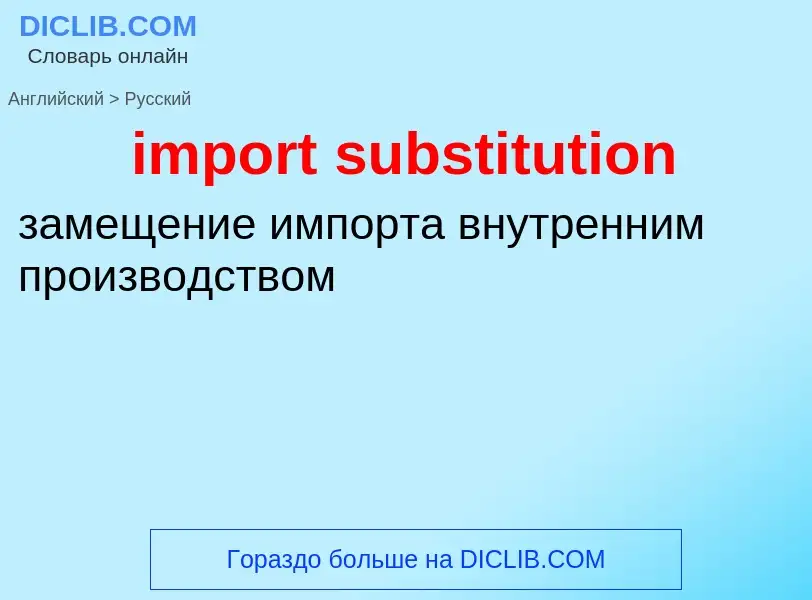Traducción y análisis de palabras por inteligencia artificial ChatGPT
En esta página puede obtener un análisis detallado de una palabra o frase, producido utilizando la mejor tecnología de inteligencia artificial hasta la fecha:
- cómo se usa la palabra
- frecuencia de uso
- se utiliza con más frecuencia en el habla oral o escrita
- opciones de traducción
- ejemplos de uso (varias frases con traducción)
- etimología
import substitution - traducción al ruso
Definición
1) Ввоз в страну иностранных товаров из-за границы (противоп.: экспорт).
2) Общее количество или общая стоимость ввозимых из-за границы товаров.
Wikipedia

Import substitution industrialization (ISI) is a trade and economic policy that advocates replacing foreign imports with domestic production. It is based on the premise that a country should attempt to reduce its foreign dependency through the local production of industrialized products. The term primarily refers to 20th-century development economics policies, but it has been advocated since the 18th century by economists such as Friedrich List and Alexander Hamilton.
ISI policies have been enacted by developing countries with the intention of producing development and self-sufficiency by the creation of an internal market. The state leads economic development by nationalization, subsidization of manufacturing, increased taxation, and highly protectionist trade policies. In the context of Latin American development, the term "Latin American structuralism" refers to the era of import substitution industrialization in many Latin American countries from the 1950s to the 1980s. The theories behind Latin American structuralism and ISI were organized in the works of economists such as Raúl Prebisch, Hans Singer, and Celso Furtado, and gained prominence with the creation of the United Nations Economic Commission for Latin America and the Caribbean (UNECLAC or CEPAL). They were influenced by a wide range of Keynesian, communitarian, and socialist economic thought, as well as dependency theory.
By the mid-1960s, many of the economists who had previously advocated for ISI in developing countries grew disenchanted with the policy and its outcomes. Many of the countries that adopted ISI policies in the post-WWII years had abandoned ISI by the late 1980s, reducing government intervention in the economy and becoming active participants in the World Trade Organization. In contrast to ISI policies, the Four Asian Tigers (Hong Kong, Singapore, South Korea and Taiwan) have been characterized as government intervention to facilitate "export-oriented industrialization".
ISI policies generally had distributional consequences, as the incomes of export-oriented sectors (such as agriculture) declined while the incomes of import-competing sectors (such as manufacturing) increased. Governments that adopted ISI policies ran persistent budget deficits as state-owned enterprises never became profitable. They also ran current accounts deficits, as the manufactured goods produced by ISI countries were not competitive in international markets, and as the agricultural sector (the sector which was competitive in international markets) was weakened; as a result, ISI countries ended up importing more. ISI policies were also plagued by rent-seeking.


.png?width=200)
.png?width=200)
.png?width=200)
.png?width=200)

.png?width=200)
.gif?width=200)

 and Trade Policies.png?width=200)
